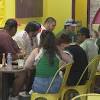Likelihood of war escalates as Putin promises to support proxy Ukraine states

Biden denounces Putin’s recognising Donetsk and Luhansk as ‘new so-called countries’ and unveils new sanctions
- Ukraine crisis – live updates

Vladimir Putin has said that Russia will support the territorial claims of its proxy states in east Ukraine, dramatically increasing the likelihood of a larger war in the near future in what Joe Biden denounced as an attempt to carve out “a big chunk” of the country.
“Who in the Lord’s name does Putin think gives him the right to declare new so-called countries?” Biden said, announcing new sanctions on two Russian banks and sweeping measures to stop Russia raising capital in western markets.
In a dramatic move Germany halted the approval process for the Nord Stream 2 gas pipeline from Russia, while the EU and the UK announced sanctions on Russia in a show of concerted western resolve, with EU foreign ministers banning Russian bond trades in the European market. Boris Johnson revealed a package of asset freezes on five Russian banks and three high net worth individuals but faced criticism from his MPs for not going further. The UK, US and EU could all bring in further sanctions.
Shrugging off threats of economic isolation, Putin enlarged the scope of Russia’s military intervention in Ukraine. Speaking at a press conference, he said that Russia recognised the borders claimed by the self-proclaimed “people’s republics” which are well beyond the current frontline and include substantial territories, including towns and cities still under Ukrainian government control.
“We have recognised the independence of these republics, which means we have recognised all their fundamental documents, including the constitution. And the constitution prescribes the borders within the Donetsk and Luhansk regions at the time when they were part of Ukraine,” Putin said.
Russian troops have already crossed into Ukraine in the Moscow-controlled territories up to the frontline. Putin’s legalistic remarks implied they could go further in the name of defending their proxy states. Any Ukrainian response could then be used to justify a full-scale, multi-pronged invasion of the kind the US and its allies have been predicting.
“We still believe that Russia is poised to go much further in launching a massive military attack against Ukraine. I hope I am wrong about that,” Biden said, noting that Russia has moved supplies of blood towards the border.
“You don’t need blood unless you plan on starting a war,” Biden said.
The president said he would send US reinforcements to the Baltic nations on Nato’s eastern flank, but stressed they were “totally defensive moves on our part”.
“We have no intention of fighting Russia,” he said.
Russia said on Tuesday it was evacuating its diplomats from Ukraine, citing concerns about their safety. Putin also received approval from his Federation Council on Tuesday to use the armed forces abroad. The decision indicated that they would be used in a “peacekeeping” force in south-east Ukraine but has raised concerns that Russian legislators have just green-lighted an all-out assault on Ukraine.
Putin last appealed to the Federation Council for a similar authorisation when he intervened in the Syrian conflict in 2015. He has never requested a similar authorisation to send troops to Ukraine, despite evidence that Russian forces have, in fact, fought there since 2014.
Putin suggested further military action would be unnecessary if Kyiv negotiated with Moscow over “difficult questions”.
He laid out three demands of the Ukrainian government: recognition of Russian sovereignty over Crimea, seized in 2014; renunciation of Ukraine’s aspirations to join Nato; and partial demilitarisation.
The government in Kyiv is unlikely to accept any of Putin’s ultimatums, which would involve surrendering a large swath of territory. Before Putin spoke, Volodymyr Zelenskiy, the Ukrainian president, addressed the country saying: “We will give nothing away, we fear nothing and nobody.”
On a visit to the Pentagon during a trip to Washington, the Ukrainian foreign minister, Dmytro Kuleba, said Putin’s aim was not about Luhansk and Donetsk but “the destruction of the Ukrainian statehood”.
“We will not fall into provocations arranged by Russia,” Kuleba said. “But if the war is imposed on us by President Putin, we will be defending ourselves”.
The Nato secretary general, Jens Stoltenberg, said the crisis was “the most dangerous moment for European security in a generation”.
The western sanctions are intended to deter Putin from an all-out offensive.
Biden imposed bans on two Russian banks, VB and a “military bank”, a likely reference to Promsvyazbank. The US also sanctioned the market in Russian sovereign debt, which Biden said “means we’ve cut off Russia’s government from western financing”. Starting on Wednesday, the US will target “Russia’s elites and their family members” with sanctions.
EU foreign ministers agreed to sanction 27 Russians and entities, all members of the Russian Duma, the lower house of parliament, as well as banks and the defence sector, while limiting Russian access to European capital markets.
The UK imposed asset freezes on five Russian banks and three wealthy Russians, but left unscathed the major UK-based oligarchs, an issue that has been a point of friction between Washington and London. Johnson said it was only “the first barrage of what we are prepared to do”.
In Kyiv, there was a growing sense that Russia had decided to escalate military conflict, and the only remaining question was scale.
“Unfortunately, there are more and more confirmations that such a decision by Russia is a reality. As Russia abandons diplomacy as a tool for resolving the conflict, Ukraine has no choice but to prepare to defend its territory,” said Bohdan Yaremenko an MP and member of parliament’s foreign policy committee.
After announcing new sanctions, Biden said Washington’s door remained open to diplomacy saying “there’s still time to avert the worst case scenario that will bring untold suffering to millions of people”.
- Ukraine
- Europe
- Russia
- Vladimir Putin
- European Union
- news


 Malaysia
Malaysia Argentina
Argentina  Australia
Australia  Austria
Austria  Brazil
Brazil  Canada
Canada  Germany
Germany  Ireland
Ireland  Italy
Italy  Mexico
Mexico  New Zealand
New Zealand  Poland
Poland  South Africa
South Africa  United Kingdom
United Kingdom  United States
United States 


















